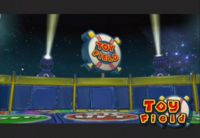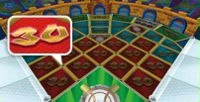Toy Field: Difference between revisions
m (Text replacement - "({{[Ff]oreign names[^{}]+}}) ({{[^b]|==)" to "$1 $2") |
|||
| Line 78: | Line 78: | ||
|FraM=Arcade | |FraM=Arcade | ||
}} | }} | ||
{{MSB}} | {{MSB}} | ||
{{Mario Super Sluggers}} | {{Mario Super Sluggers}} | ||
[[Category:Mario Superstar Baseball stadiums]] | [[Category:Mario Superstar Baseball stadiums]] | ||
[[Category:Mario Super Sluggers stadiums]] | [[Category:Mario Super Sluggers stadiums]] | ||
Revision as of 16:21, March 28, 2022

Toy Field is an unlockable minigame in Challenge Mode of Mario Superstar Baseball, and Mario Super Sluggers. Toy Field is also a separate game mode. In it, four players (human and CPU) play in an indoor stadium with several buttons on the floor. The batter must hit the ball on one of the buttons, after which they earn or lose coins depending on the effect of the button. The pitcher's objective is to strike the batter out. The fielder's objective is to catch the ball that the batter hits, stealing their coins. The player who has the most coins when the game ends is the winner.
History
Mario Superstar Baseball
Template:More images First, the players select their characters (and the difficulty for each CPU player, if any). Then, they choose to have 10, 20, 30, 40, or 50 turns for the whole game. Then, the game starts with a random batter and random pitcher - the other two players become the fielders. Each player starts a game with 100 coins. If the pitcher strikes out the batter, the pitcher steals 30 coins from the batter, and bats next. If a fielder catches a ball, the fielder gets to bat next. If the caught ball is a fly ball, the fielder steals 50 coins from the batter. If four balls are pitched (Ball Four) or the ball hits the batter (Take Your Base), it counts a turn (though there is no extra turns in this instance if this happens on the last turn), the batter goes again and a base is lit up - if all bases are lit up when either of these happen during a turn, the batter then steals 20 coins from the pitcher.
Hitting the buttons on the field have various effects. 1B hit advances all runner lights one base forward, earning 10 coins plus 30 (10 from each opponent) for any RBI. 2B Hit advances the lights 2 spots forward, earning 20 coins and again 30 for all RBI. 3B Hit spaces are the same, except earning 30 coins for the base score. The HR space in center field acts as a homerun, removing every runner light and giving the player 40 coins for landing there, and again 30 for all RBI scored.
? spaces start a slot wheel. If the wheel shows three Bob-ombs, it counts as an out and the player loses 90 coins (30 to each opponent) - if nobody catches the ball after it lands there a random player is selected to bat. Three red shells steal 30 coins from a random player. Three blue Spiny Shells steals 100 coins with the leader. Three lightning bolts switches coin totals with the leader. Three lucky 7's changes all spaces to HR for 1 turn and gives a bat again. Three 1-UP shrooms lights up all the runner lights and earns a bat-again. If the wheel doesn't show a three-of-a-kind, it counts as an out (though the coin counts are not affected) and if nobody catches the ball after it lands there a random player is then selected to bat. In the Japanese version, the letters in the word "slot" are all capital while in the North American version, the first letter is capitalized and the rest of the letters are lowercase.
Hitting the "COIN" spaces causes many coins to appear on the field. The fielders can collect the coins for a few seconds (which is worth twice as much when collected). After that time is up, the batter gets any remaining coins.
Hitting a button right next to the back wall reveals a letter. Hitting all the letters spell HOMERUN (North America) / MIRACLE (Japan and Europe), and the player gets a home run, earning them more coins. If the ball is not caught when a batter hits it, the batter goes again. If this happens in the final turn, extra turns are played until Ball Four or Take Your Base occurs, a strikeout occurs, or the ball is caught during that turn, in that point the game ends.
High scores are also stored. There is only one list of records regardless of the number of turns played and records can only be set in single player mode. At the end of a game, if the human player gets a higher score than the 5th highest score in the list (even if the player does not win the game), the usual words that say WINNER! above the winning character(s) are replaced with NEW RANKING! (or in case that the player breaks the top record, NEW RECORD!) in the middle of the screen.
The maximum amount of coins one can possess in this mode is 999.
In Challenge mode, Toy Field lasts for ten turns and the player is pitted against Bowser Jr., a Dry Bones, and a Red Dry Bones. If either of these three are chosen (on Bowser's Challenge Mode), that character is replaced by Mario.
Mario Super Sluggers

Toy Field has returned from Mario Superstar Baseball. Players now start with 300 coins in this version of Toy Field. This version of Toy Field has one Batter, and three other Outfielders and a cannon that pitches the ball to the batter. Before it pitches it, there is a roulette wheel with three different slots that affects the turn. Each slot is controlled by one of the outfielders; the outfielders tap 'A' to stop the slot they are in control of. If the slots aren't stopped, they are stopped automatically.
- The first slot controls the speed of the ball. The Mushroom is slow, flower is regular, star is fast, and crown is the fastest. There is a ? space where players won't be told of the ball's speed.
- The second slot shows where the ball goes. It can curve left, right, or go straight. There is a ? space which does not tell the player which way it curves.
- The third slot shows which item the batter gains. Items can be used on the outfielders, similar to how they can be used in the baseball game. There is also an X space, which does not give the player an item.
When the batter gets a strike, the other players get five coins each. If the batter gets a second strike, the other players get another five coins each. If the batter strikes out, they lose 45 coins and the outfielders gain even another five coins each, for a total of 15 coins each.
When the ball is hit there are a few possible results:
- When the ball is hit on a number spot (there are several numbers: 30, 60, 90, 150, and more), the player gets coins equal to the number hit. It is possible for more than 1 spot to be hit.
- If the ball is caught on the flight, the outfielder who caught the ball gains 60 coins and the batter loses 60 coins.
- If ball hits one of the bumpers on the side, the ball goes up into the air and may be easily caught. Sometimes, if the batter hits the ball far enough, bonus coins are awarded when the ball hits the bumper.
- There are 7 doors in the background that are the spaces in the furthest part of the field. When a door that is not glowing is hit, a letter flips around. If a glowing door is hit, there is a letter appearing, but there is a "Jackpot". When the Jackpot space is hit, there is a Jackpot, with the Jackpot at a large number of coins. There are three minigames within the Jackpot, and whoever wins the jackpot gains the number of coins the Jackpot was at. The Fielders and batter have no difference playing those games.
- In one game, players are told to select certain cards with certain symbols. Players must only select the cards with the certain symbol, and the person who selects the most stars wins.
- There is a game with 4 boxes, a star in one of them. Each player picks a box, and whoever selects the box with the Star wins.
- A minigame where the player has a certain number, and a few balloons. The player must pop balloons to make the exact number first.
- If the minigames have more than one winner, then the coins awarded is split.
- Once all doors are flipped around, the letters spell the word MIRACLE (Japan and Europe)/HOMERUN (North American). The person who hits the last door required gets 600 coins, removing 200 from each fielder.
- In front of the door, there is a brick wall. Above the brick wall is a panel that says "Grand Slam". When a Grand Slam is hit, the player not only bats again but gets 500 coins.
- The player can get bonus coins for hitting the wall.
- There is a mushroom bumper which bumps the ball if it is hit.
- If the ball goes to the left or right past the bumpers high enough, it is a foul ball, counted as a strike. (The player does not lose coins, but the rivals gain 5 coins each.)
A new feature in Toy Field is the ability to tackle each other. When the ball is caught by a fielder, there is a timer on top of the screen that starts at three seconds. When the ball is caught, the other two fielders can tackle the fielder to steal the ball. When the three seconds are up, the fielder who has the ball bats next. If no fielder has the ball or a home-run is scored (earning 500 coins to the batter), the previous batter "bats again". Also, each character has a different tackle. Power characters (such as Petey Piranha, Bowser, Wario, and Donkey Kong) have a long tackle. In general, fast characters with low batting (such as Toadette, Yoshi, Baby Luigi) have a short tackle making it difficult to tackle.
There is another new element in Toy Field. The name is King bonus; it either gives bonus coins or makes players lose coins. Similar to the Bonus Star's elements in Mario Party, there are additional coins rewarded or penalized, such as for tackling the most, being tackled the most, getting nice plays the most and hitting the ball perfectly.
Every time a fielder is hit by a item, they lose 30 coins, and the batter gains 30.
The maximum amount of coins one can possess in this mode has increased from the previous game to 9,999.
High scores are also stored here, except that there is now a different list for high scores depending on the number of turns played. High scores can also be set in multiplayer, though CPU players cannot set records.
Team Battle is also available in this mode. While the game plays a lot similar to Free-for-All, after the game, the teammate's scores total up the Team Score, and the higher score of the two teams wins. In addition, this type also serves its own high score lists.
Gallery
All images from Mario Super Sluggers.
Names in other languages
| Language | Name | Meaning | Notes |
|---|---|---|---|
| Japanese | トイフィールド[?] Toi Fīrudo |
Toy Field | |
| Spanish (NOA) | Cuarto de Juegos[?] | Playground |




